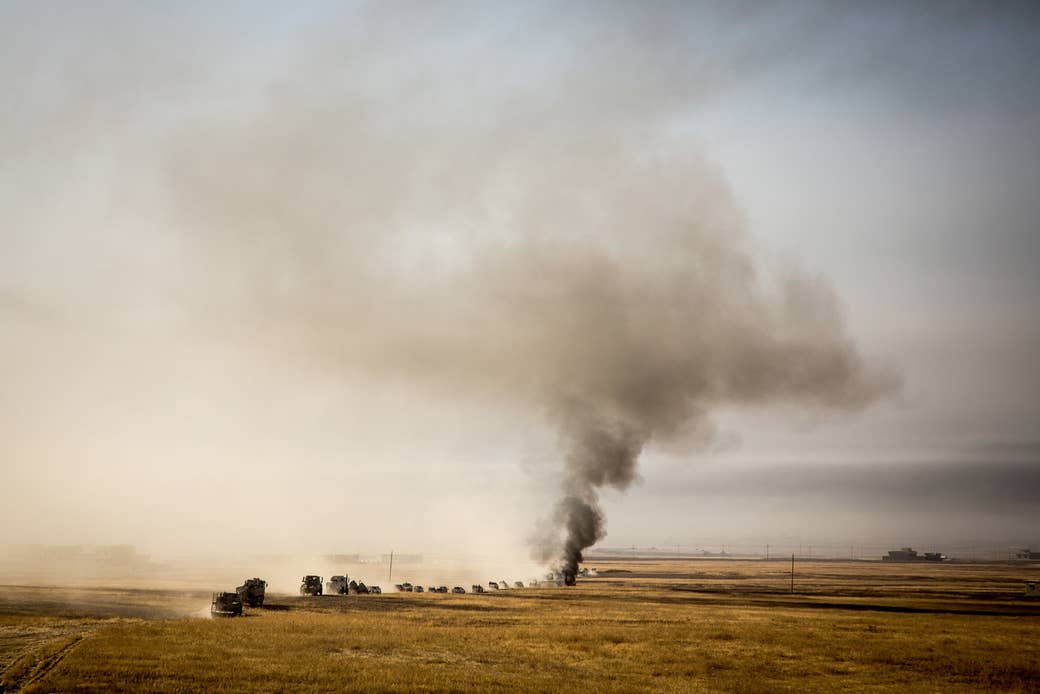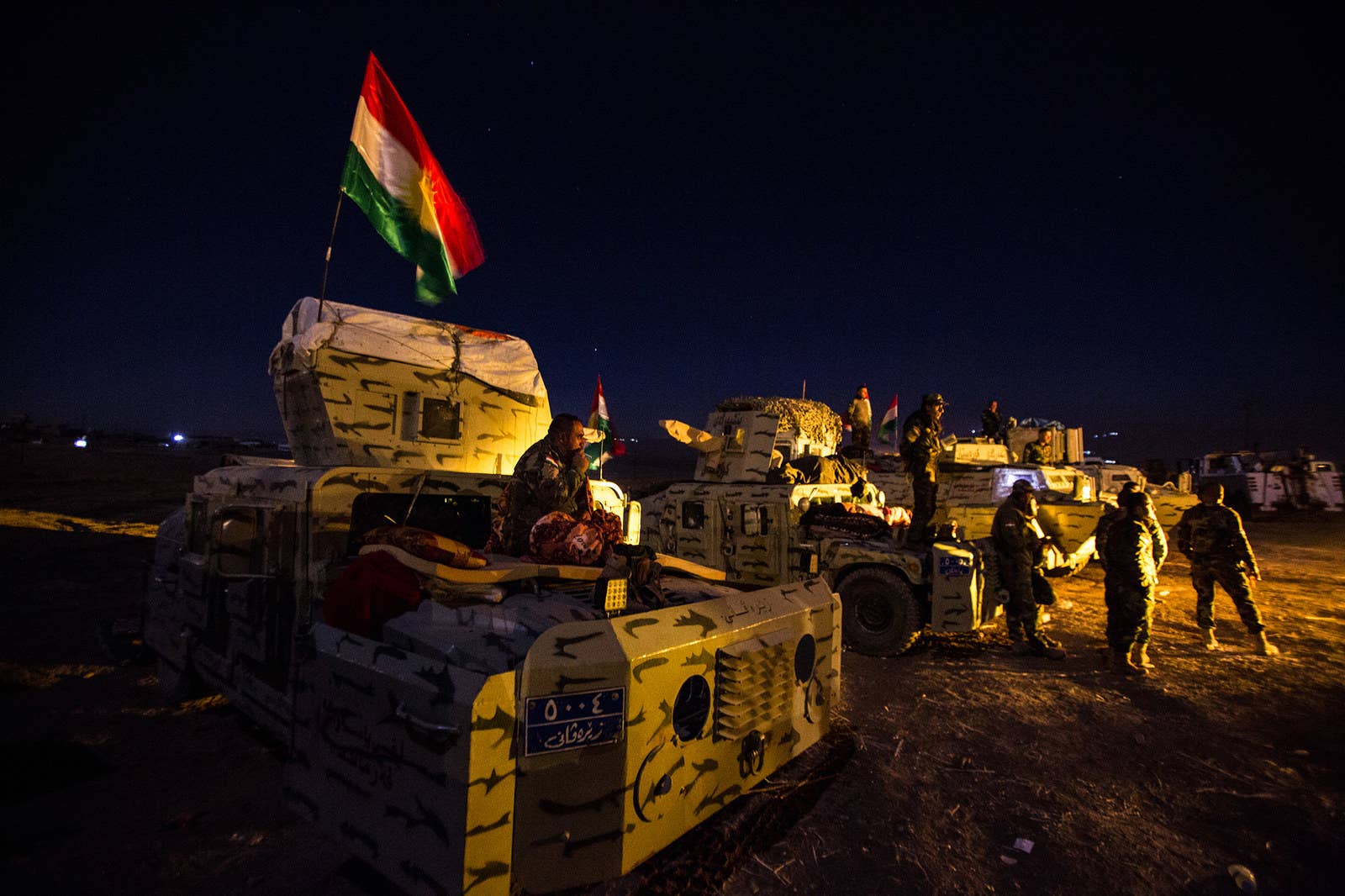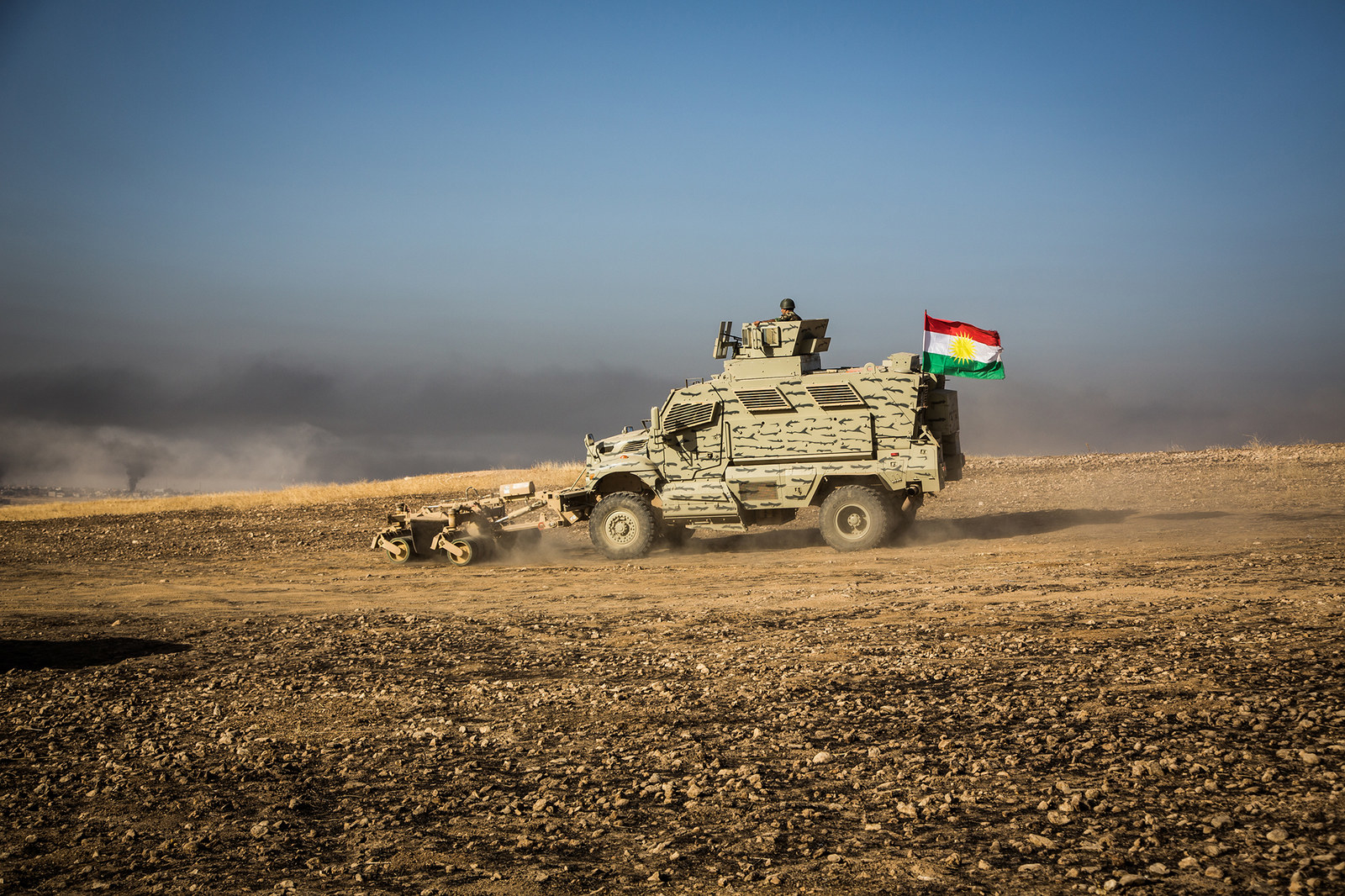
KHAZIR, Iraq — The long-awaited offensive to wrest Mosul from ISIS began early on Monday as Kurdish soldiers moved toward the militants down a dusty road.
Speculation had swirled for more than a year over the battle’s official start date, and political leaders spent months jostling for influence in the looming battle. Now, more than two years after ISIS seized Iraq's second-largest city, the advancing soldiers said they were eager for the chance to help take it back. “It feels good. We’re hoping it’s the end of them,” said Hazm Khaled, 33, as he prepared to drive a Humvee into the battle.
As the Kurdish soldiers advanced in a convoy on the Khazir front, from the east of Mosul, Iraqi soldiers were set to launch separate offensives south of the city. Airstrikes rumbled through the night and into the morning on Monday. Additional assaults on ISIS positions around Mosul promise to carry on throughout the week as part of a coordinated bid to surround the city. The Iraqi government has said that 45,000 of its troops will take part in the offensive.
Mosul, home to an estimated 1 million civilians, is the most important city ISIS holds. ISIS launched itself to international notoriety when it took the city in June 2014 — it defeated two Iraqi army divisions, seizing their US-supplied weapons, and then declared its caliphate. Given the city’s importance to the militants, some soldiers braced for a difficult fight. “This is not a conventional army. You can’t guess the outcome,” said one veteran officer in Iraq’s elite special forces from his base in northern Iraq earlier this week. “They’re counting on giving us hell in the first early stages of the operation so we lose the will to fight.”
Reached by phone in southern Turkey, a former ISIS commander who defected last year likewise said he expected the militants to battle hard to keep control of the city. "Mosul is the human and moral reservoir for ISIS, and the strategic link between Syria and Iraq, and they depend on Mosul," he said. "It has a great significance in the hearts of the fighters. They will fight fiercely."
Aid workers were braced for the coming of a new human tide, with many residents expected to flee the fighting, adding to an already dire humanitarian situation in the country. Doctors behind the front lines have set up a makeshift trauma center near Khazir in anticipation of casualties.

The Kurdish forces were menaced by mortar fire as they pushed ahead in a long convoy through the Khazir front on Monday morning toward ISIS-held towns to the north. Smoke streaked into the sky from piles of burning tires in Bartella, a key target of the Kurdish advance, as the militants sought cover from the US-led airstrikes. Bursts of machine-gun fire sounded as ISIS fought back the Kurdish advance.
But these were the tactics of an insurgent army on the retreat. The sheer manpower that Kurdish forces were pouring toward their front lines, through territory that had been under ISIS control just the night before, seemed likely to overwhelm the militants hunkered down in the small towns. Dozens of vehicles drove in succession down the winding road: armored Humvees, truck-mounted machine guns, buses full of soldiers. Col. Said Omar, a Kurdish officer in Khazir, said he hoped to overwhelm ISIS militants in the largely abandoned towns with firepower. “Our goal is to limit our casualties,” he said. “We’re going to surround the villages, and if there is ISIS inside, we’re going to pound them with artillery.”
The coordinated offensive is the culmination of more than two years of US efforts that have revolved around two goals: weakening ISIS with airstrikes while enabling local forces to take back territory with training, weapons, and advisers, as well as the help of US troops around the front lines. The plan for Mosul calls for a dizzying array of forces to join in the fight — from the peshmerga and the Iraqi army to Sunni tribal fighters and Iran-backed Shiite militia.
The initial cooperation — as evidenced by the sight of Iraqi troops pouring into peshmerga-controlled territory over the last week — is a strategic coup for US military planners. But the myriad forces remain deeply suspicious of one another. “Right now we have a good relationship with the Iraqis,” said a senior peshmerga officer working closely with the Iraqi military for the offensive, speaking on condition of anonymity. “But it’s not going to last.”
ISIS became a media sensation after it burst into the international consciousness with its seizure of Mosul, keeping itself in the headlines with ever-escalating destruction and brutality. As the forces aligned against it finalized plans for the offensive, they were also scrambling to manage the accompanying burst of publicity. More than 50 international news teams have arranged to embed with the peshmerga alone in the early stages of the fight, according to an official with Iraq's Kurdish Regional Government, which set up a special office to manage access to the front line.
The peshmerga and Iraqi militaries, with US urging, have set up special joint media cells for the offensive as well, according to media officials with both forces. "The media is a weapon,” said Gen. Yahya Rasool, the spokesman for the Iraqi military's joint operations command.

With additional reporting by Munzer al-Awad in Turkey.
